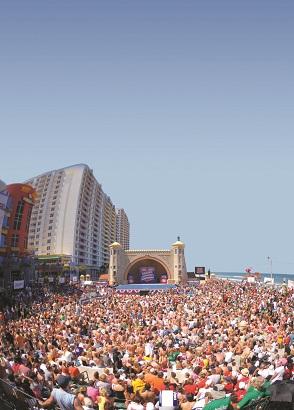
 |
| Photo courtesy of InterContinental Hotels Group |
If you are in charge of securing hotel rooms for your tournament, you need the skills of a seasoned negotiator, the legal mind of an attorney, and the prediction skills of a psychic in your selection of which hotels to use. Third party meeting planners have many paid staff doing what you are likely doing on a volunteer basis. But don’t fear, help is on the way.
Here are some recommendations on how to negotiate room blocks, rates and contract terms and conditions with hotels:
Rate Negotiation
 1. State Everything You Need Up Front
1. State Everything You Need Up Front
Whatever you want from a hotel, ask for it up front - rebate, comps, free meeting space, etc. Hotels will often agree to accommodate your concession requests, but hate to quote a rate only to find that the deal changes mid-stream. If you fail to do this, you can expect the quoted rate to go up.
2. Set the Rebate Without Fear
Base the rebate you set with the hotels on your organization's financial needs, not what the hotel community insists is the right amount. The norm across sports is a $10-$12 rebate +/-. If you are debating increasing your existing rebate from, say, $5 to $10/room night because you need the funds, don't hesitate. Tournament directors are often concerned that a $5 increase in room rate will be detrimental to their tournament and teams. In fact, a $5 increase in room rate for two nights ($10) represents only a 1% cost increase on a driving trip for a family of four that likely costs $1,000 (at a minimum) when all costs of the trip are added in. However, that $5 increase represents a 100% increase in rebate to your organization. Do the math, and your decision is obvious.
3. Negotiate One Sweetheart Deal First, and the Rest Will Follow
Always negotiate your headquarters hotel first. Offer this hotel the biggest double/double block, an additional smaller block of kings, and top billing on your website/hotel listing as the headquarters hotel (whether or not you actually have "headquarters" activity going on there). This will position you to get the best rate possible at this hotel.
 Now set that rate as your "highest" rate, and direct all other hotels you plan to use to be appropriately below that rate. Remind hotels farthest away that they are in a "rate-buy" situation - if their rate is not low enough to motivate teams to drive a greater distance in order to save money, they will not see pick-up in their block.
Now set that rate as your "highest" rate, and direct all other hotels you plan to use to be appropriately below that rate. Remind hotels farthest away that they are in a "rate-buy" situation - if their rate is not low enough to motivate teams to drive a greater distance in order to save money, they will not see pick-up in their block.
4. Use Rate Integrity Calls to Your Advantage
Hotel rates, like airline fares, fluctuate based on supply and demand. If there is a city-wide event in your town that is filling most of the hotels, that is rather easy to figure out. However, determining if a high rate quote from a particular hotel is legit (they have few rooms left to sell), or they are just good negotiators, is harder to determine.
There is a simple way to cut through the fog - do "rate integrity" checks. Before discussing rates with hotels, get on their brand website and check their rate for your dates. Make sure you are comparing apples to apples - two beds, two adults/two kids, not advance purchase, which reduces the rate. With each hotel that quotes you a rate, your rate integrity information will tell you whether or not you are being quoted a good or a bad deal. If necessary, quote that rate in your discussion - it may help. Also, do not let the hotel tell you your rate is higher because of the rebate and/or concessions. Even with those costs, because you are booking a large number of rooms, generally over a weekend, and in most cases for an annual event, your rate with those additional costs should still be lower than they are selling direct. If it is not, then don’t take their rooms.
 5. Don’t Negotiate Down from Their High Number, Negotiate Up from $0
5. Don’t Negotiate Down from Their High Number, Negotiate Up from $0
It is generally possible to negotiate a quoted rate down by $5, $10, or even $15. However at some point, if the rate quote you receive is so much higher than you want, the best action to take is to just walk away. Say you are quoted $139, and you see the hotel as being a $99 value - if you counter the $139 with $99, the hotel will counter back at $129, $119, or something still higher than you want. If you walk away, you are countering at $0 (as in no rooms). Do that and a good percentage of the hotels, either right then or later, will come back to you and ask at what rate you would take rooms in their hotel. Thus, instead of you negotiating down from $139, the hotel will be negotiating up from $0.
6. Last But Not Least, They Will Almost Always Sharpen Their Pencil
No matter the rate quote, try saying “That’s still a little high - can you do any better?” If you do, some of the hotels will respond by dropping the rate at least a little. It doesn't hurt to try.
Terms and Conditions Negotiation
If your tournament has enough overnight travelers that you sign contracts with the hotels in order to ensure the rooms are set aside for your teams, then here are the contractual terms you should not agree to:
 * Attrition - in any form. Not as a penalty (i.e. if you don't use a minimum percentage of the rooms blocked, often 80%), not as a right of the hotel to raise the rate; and not as a right of the hotel to reduce or eliminate your concessions.
* Attrition - in any form. Not as a penalty (i.e. if you don't use a minimum percentage of the rooms blocked, often 80%), not as a right of the hotel to raise the rate; and not as a right of the hotel to reduce or eliminate your concessions.
In lieu of attrition, if the hotel is adamant, give the hotel a block-review at 90 and 60 days, to make sure the hotel has not overcommitted rooms that will not be sold.
* Cancellation - cross out anything more than 30 days before arrival. Stand firm, and every hotel will agree.
* Damage - insist that any damage done to the hotel be borne by each individual guest, not the tournament.
* Indemnification - cross it out, or change it to "Mutual." You will agree to indemnify each other, but not to you only indemnifying the hotel.
* Security - cross out any line that suggests that the hotel can require you to hire and pay for security at its discretion. That is a cost of doing business for the hotel, and they know that.
* Arbitration and/or waiving your right to a trial. Cross it out, or you could watch your rebate be "arbitrated" away if the hotel decides not to pay you. Remember, most arbitrators take money owed by one party to another, divides it by two, and then asks: "Can't everyone just get along?"
The last point to consider about negotiating contracts - don’t make side deals or different deals for each hotel, except for possibly a headquarters hotel who is giving you extra or unique concessions. You need to be fair, and to do so, you must keep the playing field level. If your rebate is $10, then it should be $10 for every hotel. Walk away from any hotels that want to "reduce your rebate or concessions" in order to reduce the rate. Your credibility with the other hotels is more important than one or two room blocks.
Happy negotiating!

